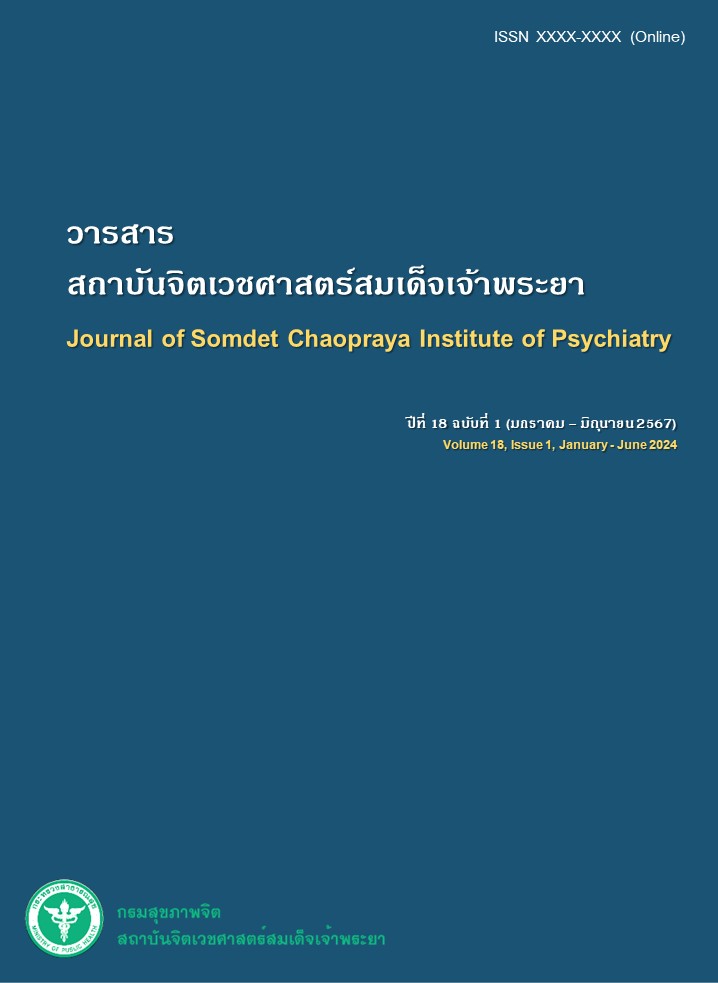ผลของโปรแกรมเสริมสร้างความเข้มแข็งทางใจด้วยโปรแกรมออนไลน์ต่อภาวะซึมเศร้าและความเข้มแข็งทางใจในผู้ป่วยโรคซึมเศร้า
คำสำคัญ:
ความเข้มแข็งทางใจ, โปรแกรมเสริมสร้างความเข้มแข็งทางใจ, โปรแกรมออนไลน์, ภาวะซึมเศร้า, ผู้ป่วยโรคซึมเศร้าบทคัดย่อ
วัตถุประสงค์ : เพื่อศึกษาประสิทธิผลของโปรแกรมเสริมสร้างความเข้มแข็งทางใจด้วยโปรแกรมออนไลน์ผ่าน แอปพลิเคชันไลน์ วิดีโอคอล ต่อภาวะซึมเศร้า และความเข้มแข็งทางใจในผู้ป่วยนอกโรคซึมเศร้าวัยผู้ใหญ่ที่มีภาวะซึมเศร้าน้อยถึงปานกลาง
วัสดุและวิธีการ : รูปแบบเป็นการวิจัยกึ่งทดลองในผู้ป่วยโรคซึมเศร้า สถาบันจิตเวชศาสตร์สมเด็จเจ้าพระยา อายุ 20 - 59 ปี มีภาวะซึมเศร้าน้อยถึงปานกลาง ช่วง สิงหาคม พ.ศ.2565 - สิงหาคม พ.ศ.2566 กลุ่มตัวอย่างทั้งหมด 48 ราย ได้รับการประเมินภาวะซึมเศร้า (PHQ9) และความเข้มแข็งทางใจ จากนั้นกลุ่มทดลอง 24 ราย ได้รับโปรแกรมผ่านแอปพลิเคชันไลน์ วิดีโอคอล 5 สัปดาห์ กลุ่มควบคุม 24 ราย ถูกติดตาม 9 สัปดาห์ ทั้ง 2 กลุ่มได้รับการประเมินภาวะซึมเศร้า และความเข้มแข็งทางใจ หลังทดลองทันที และหลังทดลอง 1 เดือน เปรียบเทียบภาวะซึมเศร้า และความเข้มแข็งทางใจ ก่อนทดลอง หลังทดลองทันที และหลังทดลอง 1 เดือน โดยใช้สถิติการวิเคราะห์ความแปรปรวน และสถิติที
ผล : ก่อนทดลองกลุ่มตัวอย่างทั้ง 2 กลุ่ม มีภาวะซึมเศร้า และความเข้มแข็งทางใจ ไม่แตกต่างกัน หลังทดลองทันทีและหลังทดลอง 1 เดือน เฉพาะกลุ่มทดลองเท่านั้นที่มีภาวะซึมเศร้าลดลง ความเข้มแข็งทางใจเพิ่มขึ้น อย่างมีนัยสำคัญ กลุ่มควบคุมมีภาวะซึมเศร้าลดลง ความเข้มแข็งทางใจเพิ่มขึ้น เฉพาะหลังทดลองทันทีอย่างมีนัยสำคัญ เมื่อเปรียบเทียบระหว่างกลุ่มพบว่า กลุ่มทดลองมีภาวะซึมเศร้าต่ำกว่า และความเข้มแข็งทางใจสูงกว่าเมื่อหลังทดลอง 1 เดือน
สรุป : โปรแกรมเสริมสร้างความเข้มแข็งทางใจ ด้วยโปรแกรมออนไลน์ผ่านแอปพลิเคชันไลน์วิดีโอคอลในผู้ป่วยนอกที่ได้รับการวินิจฉัยว่าเป็นโรคซึมเศร้าวัยผู้ใหญ่ที่มีภาวะซึมเศร้าน้อยถึงปานกลาง สามารถลดภาวะซึมเศร้า และเพิ่มความเข้มแข็งทางใจได้
เอกสารอ้างอิง
Dudek KA, Dion-Albert L, Kaufmann FN, Tuck E, Lebel M, Menard C. Neurobiology of Resilience in depression: immune and vascular insights from human and animal studies. Eur J Neurosci 2021; 53(1): 183-221.
Southwick SM, Vythilingam M, Charney DS. The psychobiology of depression and Resilience to stress: implications for prevention and treatment. Annu Rev Clin Psychol 2005; 1 :255-91.
Aburn G, Gott M, Hoare K. What is Resilience? An Integrative Review of the empirical literature. J Adv Nurs 2016; 72(5): 980-1000.
Eli B, Zhou Y, Liang Y, Cheng J, Wang J, Huang C, et al. Depression in Children and Adolescents on the Qinghai-Tibet Plateau: Associations with Resilience and Prosocial Behavior. Int J Environ Res Public Health 2021; 18(2): 440.
Sharpley CF, Bitsika V, Jesulola E, Fitzpatrick K, Agnew LL. The association between aspects of psychological Resilience and subtypes of depression: implications for focused clinical treatment models. Int J Psychiatry Clin Pract 2016; 20(3): 151-6.
Wermelinger Ávila MP, Lucchetti AL, Lucchetti G. Association between depression and Resilience in older adults: a systematic review and meta-analysis. Int J Geriatr Psychiatry 2017; 32(3): 237-246.
Peters RB, Xavier J, Mondin TC, Cardoso TA, Ferreira FB, Teixeira L, et al. BDNF Val66Met polymorphism and Resilience in major depressive disorder: the impact of cognitive psychotherapy. Braz J Psychiatry 2021; 43(1): 22-28.
Reus GZ, de Moura AB, Silva RH, Resende WR, Quevedo J. Resilience Dysregulation in Major Depressive Disorder: Focus on Glutamatergic Imbalance and Microglial Activation. Curr Neuropharmacol 2018; 16(3): 297-307.
Fischer AS, Hagan KE, Gotlib IH. Functional neuroimaging biomarkers of Resilience in major depressive disorder. Curr Opin Psychiatry 2021; 34(1): 22-28.
De Berardis D, Fornaro M, Valchera A, Rapini G, Di Natale S, De Lauretis I, et al. Alexithymia, Resilience, somatic sensations and their relationships with suicide ideation in drug naïve patients with first-episode major depression: An exploratory study in the "real world" everyday clinical practice. Early Interv Psychiatry 2020; 14(3): 336-342.
Marschollek L, Bonnet U. Do patients' Resilience and subjective illness representation predict the outcome of a routine inpatient treatment program of major depressive disorder? Eur Arch Psychiatry Clin Neurosci 2021; 271(7): 1309-1317.
Grotberg EH. Tapping your inner strength: How to find the Resilience to deal with anything. New Harbinger; 1999.
Jenkins EK, McAuliffe C, Hirani S, Richardson C, Thomson KC, McGuinness L, et al. A portrait of the early and differential mental health impacts of the COVID-19 pandemic in Canada: Findings from the first wave of a nationally representative cross-sectional survey. Prev Med 2021; 145: 106333.
Díaz-García A, Franke M, Herrero R, Ebert DD, Botella C. Theoretical adequacy, methodological quality and efficacy of online interventions targeting Resilience: a systematic review and meta-analysis. Eur J Public Health 2021; 31(31 Suppl 1): i11-i18.
Ang WHD, Chew HSJ, Dong J, Yi H, Mahendren R, Lau Y. Digital training for building Resilience: Systematic review, meta-analysis, and meta-regression. Stress Health 2022; 38(5): 848-69.
Lotrakul M, Sumrithe S, Saipanish R. Reliability and validity of the Thai version of the PHQ-9. BMC Psychiatry 2008; 8: 46.
ไพจิตร พุทธรอด. ผลของโปรแกรมการเสริมสร้างความเข้มแข็งทางใจต่อความรู้สึกมีคุณค่าในตนเอง และภาวะซึมเศร้าในผู้สูงอายุที่เป็นโรคซึมเศร้า. วารสารชุมชนวิจัยและพัฒนาสังคม 2564; 15(1): 70-82.
สำนักส่งเสริมและพัฒนาสุขภพจิต กรมสุขภาพจิต กระทรวงสาธารณสุข. แบบประเมินความเข้มแข็งทางใจ. นนทบุรี: กรมสุขภาพจิต; 2563.
Nuntatikul P, Prathurng H, Piyalamporn H. Prevalence of and factors associated with depression in Thai adult general OPD patients at Phanomphrai hospital, Roi-Et province, Thailand. Health Res 2010; 24fiuppI2): 133-6.
Johnson JR, Emmons HC, Rivard RL, Griffin KH, Dusek JA. Resilience Training: A Pilot Study of a Mindfulness-Based Program with Depressed Healthcare Professionals. Explore (NY) 2015; 11(6): 433-44.
พัชราวไล ควรเนตร, เพ็ญนภา แดงด้อยุทธ์, รัชนีกร อุปเสน. ผลของโปรแกรมการสร้างความเข้มแข็ง ทางใจต่อความรู้สึกมีคุณค่าในตนเองของผู้ป่วยโรคซึมเศร้า. วารสารการพยาบาลจิตเวชและสุขภาพจิต 2561; 32(2): 39-51.
Joyce S, Shand F, Lal TJ, Mott B, Bryant RA, Harvey SB. Resilience@Work Mindfulness Program: Results from a Cluster Randomized Controlled Trial with First Responders. J Med Internet Res 2019; 21(2): e12894.
Hoorelbeke K, Koster EHW. Internet-delivered cognitive control training as a preventive intervention for remitted depressed patients: Evidence from a double-blind randomized controlled trial study. J Consult Clin Psychol 2017; 85(2): 135-146.
Acosta MC, Possemato K, Maisto SA, Marsch LA, Barrie K, Lantinga L, et al. Web-Delivered CBT Reduces Heavy Drinking in OEF-OIF Veterans in Primary Care with Symptomatic Substance Use and PTSD. Behav Ther 2017; 48(2): 262-276.
De Voogd EL, de Hullu E, Burnett Heyes S, Blackwell SE, Wiers RW, Salemink E. Imagine the bright side of life: A randomized controlled trial of two types of interpretation bias modification procedure targeting adolescent anxiety and depression. PLoS One 2017; 12(7): e0181147.
De Voogd EL, Wiers RW, Salemink E. Online visual search attentional bias modification for adolescents with heightened anxiety and depressive symptoms: A randomized controlled trial. Behav Res Ther 2017; 92: 57-67.
Brog NA, Hegy JK, Berger T, Znoj H. Effects of an internet-based self-help intervention for psychological distress due to COVID-19: Results of a randomized controlled trial. Internet Interv 2022; 27: 100492.
อายุพร กัยวิกัยโกศล, สุทธามาศ อนุธาตุ, พัชรินทร์ นินทจันทร์. ผลของโปรแกรมการเสริมสร้างความ แข็งแกร่งในชีวิตต่อภาวะซึมเศร้าของนักศึกษพยาบาล วิทยาลัยพยาบาลแห่งหนึ่ง. วารสารการพยาบาลจิตเวชและสุขภาพจิต 2558; 29(1): 27-43.
Noh D. The Effect of a Resilience Enhancement Program for Female Runaway Youths: A Quasi-Experimental Study. Issues Ment Health Nurs 2018; 39(9): 764-772.
ดาวน์โหลด
เผยแพร่แล้ว
รูปแบบการอ้างอิง
ฉบับ
ประเภทบทความ
สัญญาอนุญาต
ลิขสิทธิ์ (c) 2024 วารสารสถาบันจิตเวชศาสตร์สมเด็จเจ้าพระยา

อนุญาตภายใต้เงื่อนไข Creative Commons Attribution-NonCommercial-NoDerivatives 4.0 International License.
บทความที่ได้รับการตีพิมพ์เป็นลิขสิทธิ์ของวารสารสถาบันจิตเวชศาสตร์สมเด็จเจ้าพระยา



